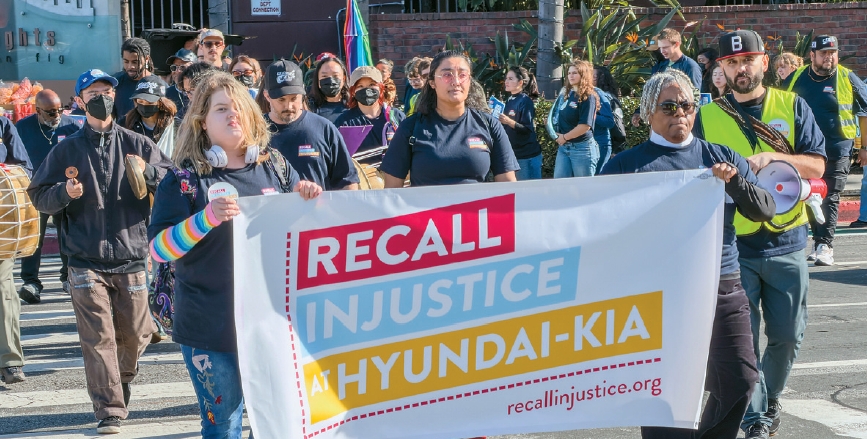More than one million auto enthusiasts visit the LA Auto Show, and protesters used the venue to demand that Hyundai and Kia address alleged illegal labor practices across their U.S. supply chains.

At 1 p.m. on November 21, about 50 demonstrators gathered outside the LA Convention Center, where the auto show was held, and launched a campaign titled “Recall Injustice at Hyundai-Kia.”
The protest was led by Jobs to Move America (JMA), a nonprofit that recently filed a lawsuit against Hyundai and Kia over alleged child labor and illegal labor practices. Representatives from more than 40 other nonprofit organizations joined the action. Before the protest began, organizers delivered an investigative report and a letter outlining their demands to senior executives at the companies.
Madeline Janis, JMA’s executive director, said the group welcomed investments from Hyundai and Kia, but argued that the companies must provide “good jobs.” She cited “12 deaths, more than 1,000 serious injuries, 12- to 13-year-old child labor, the misuse of incarcerated labor, and fines for violating labor standards” as the most urgent concerns. She added that although the companies promote “clean cars,” the production process “remains dirty.”
The protest featured actual vehicle parts from Hyundai and Kia, including trunk lids, bumpers, headlights, and hubcaps. One participant carried a trunk lid on their head, while other detached parts were placed on the ground to highlight the symbolism of “recalled vehicles.” Demonstrators held signs reading “Investigate Hyundai-Kia Supply Chains” and “Electric Cars Without Forced Prison Labor,” chanting “Recall, Injustice” and “Good jobs in every car.”
JMA also released a report based on two years of public-records research. The findings included death cases, worker injuries, and illnesses reported over the past nine years in the companies’ U.S. supply chains. The report also cited instances of 13-year-olds working at nine supplier facilities in the Alabama region.
Protesters urged Hyundai and Kia to adopt a Community Benefits Agreement (CBA) to resolve the problems. The proposed CBA includes standards on wages, benefits, safety and health, environmental monitoring, and local hiring and training programs.
Luis Robledo, a founder of JMA, asked why the companies “recall defective vehicles but not their misconduct,” saying that “injustice is built into Hyundai and Kia vehicles.”
Will Tucker, JMA’s Southern regional director, said that “past sins” of Southern industry are “reappearing in Hyundai and Kia’s supply chains,” adding that federal authorities have already filed lawsuits related to child labor. He said that adopting a CBA could make the companies a model within the industry.
Warren Tidwell, head of the nonprofit Across Alabama, said he is a customer who owns a Hyundai produced in an Alabama factory. He stated that incarcerated workers in the region earn “two dollars a day,” which depresses wages statewide. He added that many workers rely on free food distribution and have little time with their families.
A day earlier, on November 20, JMA and more than 40 allied groups delivered their investigative report and demand letter directly to Seungkyu Yoon, the head of Kia America, at the auto show. The same day, they visited the Hyundai and Kia U.S. headquarters in Orange County, urging executives to begin negotiations.
BY HANKIL KANG [kang.hankil@koreadaily.com]
![Troublesome delivery robots damage gardens, snarl streets Delivery robots in urban areas including LA Koreatown and Hollywood have been involved in a string of incidents, blocking fire engine responses, crossing police lines at active scenes, and colliding with homes and motorcycles. [KTLA • Reddit capture]](https://www.koreadailyus.com/wp-content/uploads/2026/02/0226-delivery-robot-compile-100x70.jpg)
![Nonprofit leaders accused of diverting millions meant for the vulnerable Judy Baca, who faces allegations of embezzling $5 million, participates in work on “The Great Wall of Los Angeles” mural in 2023. [Sangjin Kim, The Korea Daily]](https://www.koreadailyus.com/wp-content/uploads/2026/02/0226-nonprofit-1-100x70.jpg)
![Family of army veteran killed in San Antonio shooting launches fundraiser A screenshot of the GoFundMe fundraising page created for Kyung Chang Lee. Donations are being collected to support the family of Lee, who was killed in the San Antonio, Texas, shooting. [GoFundMe capture]](https://www.koreadailyus.com/wp-content/uploads/2026/02/0225-KyungChangLee-100x70.jpg)
![Cartel leader’s killing sparks unrest, prompts Koreans to reconsider Mexico trips Downtown Guadalajara in Mexico’s state of Jalisco, which resembled a war zone on February 22 amid arson and other violence by drug cartel members, appears quiet on February 24. The area, usually crowded with tourists and residents, saw a sharp decline in foot traffic and public transportation use. [Pablo Lemus Navarro/X account]](https://www.koreadailyus.com/wp-content/uploads/2026/02/0225-Mexico-100x70.jpg)